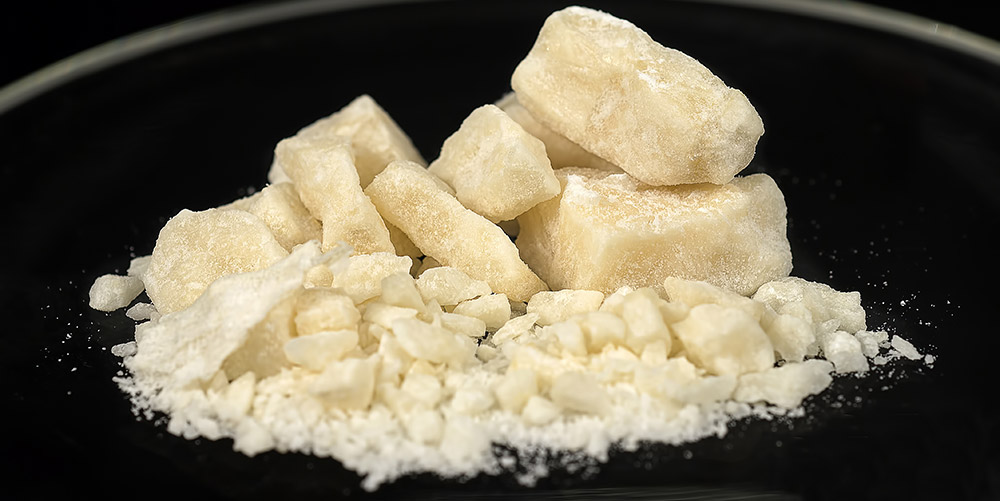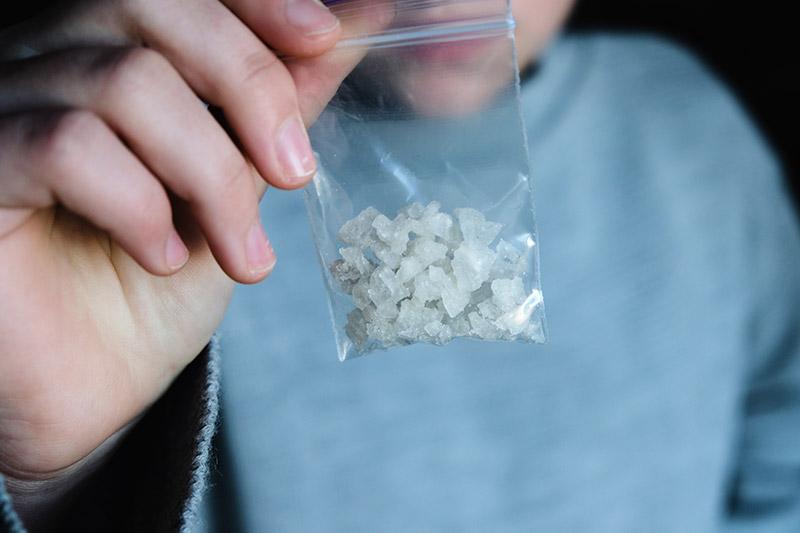Crack Cocaine Addiction & Abuse
Crack cocaine is a drug that is known for its high rate of addiction and abuse. If you or someone you love is struggling with crack cocaine addiction, it is important to find the help that you need. Understanding crack cocaine addiction, its impact on a healthy mind and body, and the options for treatment will assist in finding the right resources and support to overcome dependence.
- What is Crack Cocaine Addiction?
- Crack Cocaine Addiction VS. Abuse
- What Makes Crack Cocaine Addictive?
- How Crack Cocaine Addiction Develops
- Signs & Symptoms of Crack Cocaine Addiction
- The Dangers of Crack Cocaine Addiction
- Crack Cocaine Use in Teens
- Crack Cocaine Use in Pregnancy
- Crack Cocaine Use and Employment
- Getting Help for Crack Cocaine Addiction
What is Crack Cocaine Addiction?
Crack cocaine is essentially cocaine in rock form. The pharmacology of crack cocaine and cocaine is the same, the difference is the way these substances are ingested (WebMD). Crack cocaine is heated and smoked. Smoking crack cocaine leads to faster effects of the drug because it is more concentrated than cocaine. This makes it a riskier form of cocaine because it rapidly increases the potential for addiction and abuse.
Learning the different names of crack cocaine will make it easier to identify the substance. Crack cocaine’s street names include Apple Jacks, Charlie, Cloud, Crack, Hail, Ice Cube, Nuggets, Rocks, and Snow Coke among others (DrugFreeWorld). It is an illegal substance across the world and is currently listed as a Class A controlled substance in the UK.

Crack Cocaine Addiction VS. Abuse
Crack cocaine is distinguished by its rock or crystal-like form. Because it is an illicit substance, highly addictive, and causes harmful effects on the mind and body, the single use of crack cocaine is deemed as substance abuse. Unlike cocaine that is snorted or injected, crack is smoked and therefore affects the function of the brain a lot faster. It also creates an instant high when used; however, this “high” does not last very long. Once individuals come down from the euphoria, they feel low or even depressed. This increases the need to use crack cocaine to restore the high.
Using crack cocaine once is considered abuse of the drug because it is illegal and has the highest risk of developing dependence. However, individuals who suffer crack cocaine addiction will become preoccupied with the need to use the drug. They may sacrifice relationships in an effort to maintain addiction and will not be able to stop or quit using on their own. Using the drug once or only a few times can also create withdrawal symptoms when it is not ingested.

What Makes Crack Cocaine Addictive?
Crack cocaine has rapid effects on the brain because of the way it is ingested. Smoking crack will reach the brain a lot faster than other methods and creates an instant high. The difference between crack cocaine and other drugs is the intensity of the high or euphoria experienced.
Crack can create an intense euphoria because it works on the brain’s “feel-good” neurotransmitter, dopamine. When crack is used, the body releases dopamine in large volumes which creates intense pleasure (Healthline). Over time, crack cocaine causes dysfunctional neurotransmitter communication and one can no longer regulate feeling pleasure at all. Individuals become dependent on the drug to feel good. This is where the high risk of addiction sets in.
How Crack Cocaine Addiction Develops
The problem with crack cocaine is the rate and intensity at which the high is experienced. The high is described as an intense rush or state of euphoria that affects the brain’s ability to communicate effectively. The brain’s ability to release a natural feel-good hormone such as dopamine is compromised. Users of crack cocaine are unable to regulate mood and pleasure without relying on the drug. When coupled with a family history of drug abuse or psychological trauma, the propensity for addiction increases significantly. Let’s look at some of the reasons for developing crack cocaine dependence.
Repeat Exposure
While many types of drugs require frequent use or increased doses of the substance to form dependent behaviour, crack cocaine only needs to be ingested one time to develop addiction. Repeat exposure is considered the frequency of substance use or rate of exposure to a drug that increases the risk of dependence.
Trauma & Pre-existing Mental Health Conditions
Trauma can lead to psychological conditions such as PTSD, anxiety, and depression. Individuals who feel overwhelmed, stressed, and suffer from flashbacks or insomnia are at higher risk of using a substance to relieve their symptoms. Crack cocaine with its intense rush of pleasure, can hide many of the uncomfortable symptoms associated with trauma and increase the risk of addiction.
Individuals with pre-existing mental health conditions are at greater risk of addiction because of the desire to control and ease limiting and disruptive symptoms. For those who present with a mental health disorder and crack cocaine addiction at the same time, it is known as a dual diagnosis. Individuals with a dual diagnosis will require specialised treatment programmes to address both the psychological condition and addiction.

A Family History of Drug Use
Family history and genetics cannot be ignored when considering the development of crack cocaine addiction. According to studies involving family history and crack cocaine use, there is evidence to suggest a link between the two.
Research shows a higher occurrence of crack cocaine use between immediate family members such as siblings. This was also true for families where alcohol abuse and addiction were rife which included crack cocaine dependence (Springer).
Signs & Symptoms of Crack Cocaine Addiction
Many try to hide addictions to alcohol and drugs as best they can. When it comes to crack cocaine, the intensity of the drug and the rapid rate of addiction makes it extremely difficult to conceal. The following signs and symptoms are associated with crack cocaine addiction:
- Hyperactive and fidgety
- Aggression
- Over-confidence
- Pupil dilation
- Rapid respiration
- Scorched lips from smoking burning pipes
- Rapid weight loss
Diagnosing Crack Cocaine Addiction
A GP or therapist should be consulted to diagnose crack cocaine addiction. Professionals use the Dast (Drug Abuse Screening Test) 10 questionnaire to assess individuals for drug use and addiction. It contains 10 yes or no questions concerning the frequency of crack cocaine use and how it is used (Bu.edu). The questionnaire only takes a few minutes to administer. This allows professionals to determine a plan of action to help individuals who show signs of addiction.

The Dangers of Crack Cocaine Addiction
The danger of crack cocaine addiction lies in its fast-acting effects on the brain and the body. Individuals who become addicted to crack cocaine experience cravings for the substance. It has a negative impact on the ability to sustain concentration, to manage obligations, and often leads individuals to engage in risky sexual behaviour or violence.
Crack cocaine disrupts the normal neurotransmitter communication in the brain which makes it difficult for the body to regulate mood and pleasure naturally. It creates a cycle of dependence because one cannot experience pleasure without using the substance.
Medical risks are also associated with crack cocaine addiction. Because the substance increases blood pressure, there is the possibility of suffering a stroke. Crack cocaine is also known to cause the rupture of the body’s largest artery which is referred to as an aortic dissection (Medicine.net). Ongoing use of crack cocaine increases suicidal tendencies and the risk of death.
Cocaine and crack cocaine use in the UK is steadily rising. Reports by Statista indicate that cocaine-related deaths reached over 700 in Wales in 2019. For the same year, the UK has the highest percentage of cocaine users at 2.7% compared to the rest of Europe.
Crack Cocaine Use in Teens
The use of crack cocaine in teens is becoming more problematic than adult use. Adolescents who are dependent on crack cocaine are at higher risk of mental health issues including the development of anxiety and depression. The problem is the impact of crack cocaine on normal brain development in teens. Youth are at risk of suffering limitations in cognitive function and in memory with the use of crack cocaine (VeryWellMind).
Crack Cocaine Use in Pregnancy
Crack cocaine has a detrimental impact on the healthy development of unborn babies including the well-being of pregnant women. Using crack during pregnancy disrupts the delivery of oxygen and nutrients to the foetus. It can cause the following problems:
- Premature birth rates
- Miscarriage
- Underweight infants
- NAS or neonatal abstinence syndrome (babies are born addicted to crack)
Babies who are born to mothers actively using crack during pregnancy have shown higher rates of development problems in adulthood. These include learning problems, mental health disorders, and changes in the brain (WebMD).
Women who have given birth to infants and who use crack cocaine can transfer the drug to their babies through breast milk. This increases the risk of babies developing addiction even though they were not actively exposed to the drug whole in utero.
Crack Cocaine Use and Employment
The ability to hide addiction to crack cocaine is minimal. Individuals who suffer crack cocaine dependence are agitated, unable to concentrate for too long and suffer physical difficulties such as poor health.
A closer look at employment data and the use of crack cocaine shows that crack use was highest for unemployed groups followed by part-time and full-time workers.

Getting Help for Crack Cocaine Addiction
Crack cocaine is a highly addictive drug and challenging to quit without professional support and intervention. When you are ready to take the brave steps to overcome crack cocaine addiction and abuse, there are treatment options to help you regain your independence and your life.
Inpatient programmes are offered within a residential or private rehab. Private rehab includes a medically supervised crack cocaine detox. The purpose is to safely allow the body to remove all traces of the substance so you can benefit from clear-mindedness and the support offered by the treatment. You will remain at the centre full-time while receiving therapy and counselling.
Outpatient services include free NHS services. For those who find themselves or a loved one in a high-risk or life-threatening situation, the NHS may provide a medically assisted detox although this is in exceptional circumstances. By consulting with your GP you can be referred to a free outpatient programme. You can also apply for self-referral to enter an outpatient programme in the UK. Most free treatment programmes will place individuals on a waiting list.
Support groups such as NA and CA are also available for those struggling with cocaine and crack cocaine addiction, and provide immense support for long term recovery.
If you are unsure about the options available to you and you need assistance with finding treatment, please feel free to contact us. We are here to help you with the care and support required to overcome obstacles and fight addiction.
